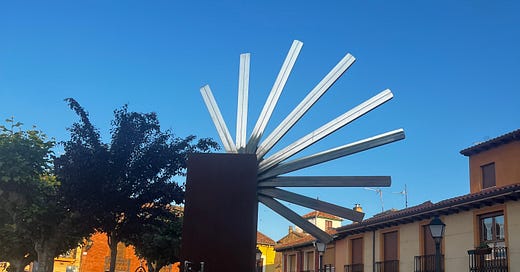Today I felt as good as I’ve ever felt - and so glad I took extra rest the day before.
The change of plans yesterday also allowed me to walk the entire leg today alone, which I happily embraced. A third of the way through, I crossed paths with someone who I had talked to in passing multiple times before, but never got the chance to exchange names or have a full conversation. We talked for an hour about our motivations, values, and convictions newly found on the trail.
Not bad for a first conversation, huh? Actually, you wish your first conversations with people were like that.
I thought to myself afterward about coincidence. What were the chances that I hurt my knee, healed enough to walk the next day, and happened across someone to have the conversation we had, meaningful and deep as it was?
I have anecdotally heard people talk about insane coincidence as part of their religious conviction - the idea that past a certain point some of the incredible things that you get to experience in this life seem too unlikely to just be coincidence. There’s something intentional lurking.
I think this is a bit of a fallacy personally - yes, the probability might be low, but at least something had to happen, right? And if all of those somethings are low chance - calling this more than a coincidence ignores the 100 percent possibility that something happens.
But I won’t deny that I ask myself the question What are the chances? emotionally, if not necessarily logically. I think about it with my closest relationships and friendships, my highlight moments in life, the improbable victories, and yes, the improbable failures. All the fluffy stuff and magic of our lives.
But I also think about how the Camino is great at what I’ll call intentional coincidence. I’m defining this to mean coincidence that is made more likely than otherwise due to the structures one might inhabit.
Yes, it’s very unlikely that this person and I happened to be walking at exactly the right paces, with the correct alignment of rest breaks, starting at the right time of day, to intersect. But also, framed another way, the Camino Frances is designed as one path. Just one. So the people you see one day, you are structurally likely to see the next. And so on and so forth.
So it really wasn’t that improbable after all. The Camino made it a possibility, even through it probably wasn’t thinking about this exact situation on this exact day with these exact two people.
But it is clear that the Camino structurally provides community, encourages vulnerability, and facilitates empathy. Now I’m not saying St. James was thinking about this as he carved out the original way, so yes I am referring to the Camino as if it were alive.
It feels very alive to me.
There is a beautiful, bright side to intentional coincidence, and then there’s an ugly, dark side. Because just as systems are designed to liberate, they are designed to oppress.
The police system didn’t decide that George Floyd was going to be the specific person for whom a small petty theft crime was to be blown up into a heinous act of police brutality. It didn’t decide that Derek Chauvin was going to be the exact police officer who put his knee on Floyd’s neck. But the police system certainly made structural decisions that made such an encounter more likely. Qualified immunity, army-like training and militarization, and much much more. Anyone who tells you that a cacophony of random implications led to the murder as a random chance event is talking at one level more detailed than where they should be talking - not at the level of that specific encounter, but the general model of that encounter.
So no, events like these are not just coincidences that we submit to. They involve a level of intentionality, even when that intentionality as not as granular as to exactly implicate a specific situation. But that’s when such intentionality is more dangerous (or freeing, depending on the system) - its generality corresponds with its applicability.
Let me be clear - I have graciously received so many happy small chance events on the trail. And my commentary on political systems is not a diss on religiosity. I just wanted to share a theoretical tool I’ve been thinking about to understand the good and the bad of the systems we inhabit.
And nothing makes me happier than to realize that I have actively chosen an experience that facilitates happy coincidence, because in terms of raw positive emotion, those are hard to beat.




